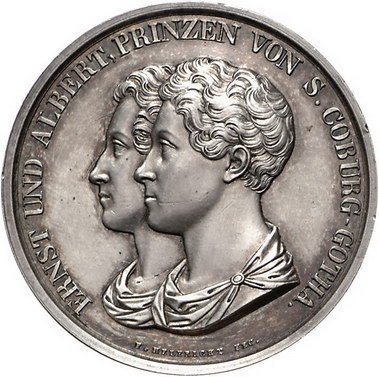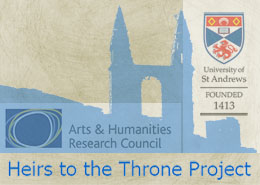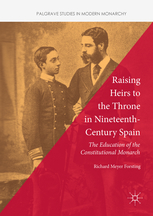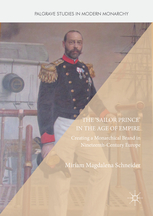The Importance of being Albert’s Brother
Charles Jones
“I was to separate from my brother, and the earnest duties of life pointed out to each of us his particular path”.
This excerpt from Ernst’s Memoirs, describing the first time that he and Albert were separated after completing their University studies in 1838, illustrates the expectations of the duty required of royal progeny. Both young men were to be groomed for high office. What is striking about the preparation the brothers completed, however, was the difference in emphasis. Ernst, as the heir apparent to the duchy of Saxe-Coburg, was not the main focus of the academic curriculum. His brother Albert, on the other hand, a viable prospect for the role of consort of the monarch of a powerful nation, was. To prepare for Albert’s unique role, an innovative programme of study had been carefully crafted. In essence, the training Ernst received was a direct result of Albert’s specific anticipated path.
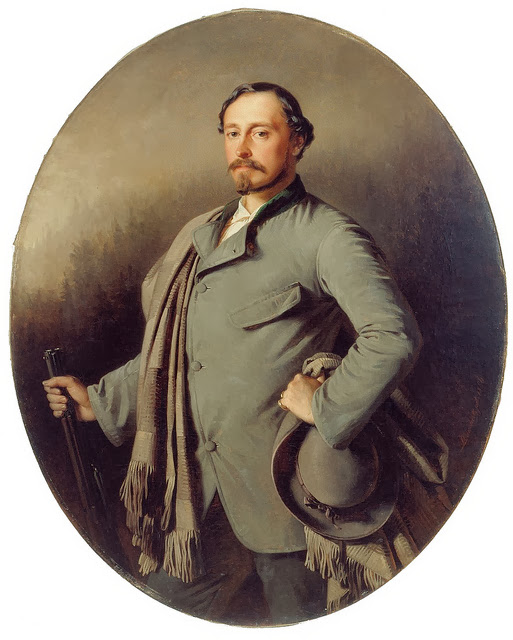
Ernst II of Saxe-Coburg and Gotha in hunting costume c.1856 by Richard Lauchert © Kunstsammlungen der Veste Coburg
Ernst August Karl Johann Leopold Alexander Eduard was born in the gothic surroundings of Schloss Ehrenburg on 21 June 1818. He was the first son and heir apparent of Ernst III Duke of Saxe-Coburg-Saalfeld and Princess Louise of Saxe-Gotha-Altenburg. His christening on 24 June at the church of St Moritz was celebrated with great ceremony, even receiving 12,455 florins from the people of Coburg-Saalfeld as a baptismal gift. The birth of the young prince was closely followed by the arrival of his brother Albert on 26 August 1819. The two brothers would prove to be inseparable and were reared essentially as twins.
In 1824, when Ernst was six years old, he would experience the loss of a loved one for the first time, not to an early grave but to a family scandal. His mother, Louise, who was still a young woman and ignored by her philandering husband, was suspected of having had an affair of her own. In a revealing act of hypocrisy and cruelty, Duke Ernst publically banished his wife. Young Ernst was never to see her again. Infidelity was not unusual for the Royal House. Ernst himself had two illegitimate children. But, the mere rumour that his young wife was having an illicit affair was enough cause to sever the relationship. By 1825 he had formally divorced her. As a consequence of the regional political situation and the dissolution of the marriage, in 1826 Ernst became Ernst I of the newly created duchy of Saxe-Coburg and Gotha.
In his memoirs, Ernst II skims over this clearly painful period, noting only that he was saddened to lose his mother. With regard to the relationship with his father, he paints an idealised picture. The father is portrayed as an educator and mentor, an object of both idolization and fear. The reality was starker: put simply, he was seldom around and when he was, he was a rigid disciplinarian who demanded manly behaviour from his young sons.
Ernst’s primary education began when he was scarcely five years old. He and Albert were removed from the nursery and their nanny. They were placed in the sole charge of Johann Christoph Florschütz. Florschütz, lovingly called ‘the Rath’, due to his official capacity as a Coburg councillor (GR “Hofrath”), was an experienced tutor with a liberal mindset. Under Florschütz, the princes were provided an education that was, in Ernst’s words, “then quite uncommon in Germany”. In addition to the usual fare of classics, art, and music, he was introduced to the natural sciences and history. Rather than learning Greek, as was customary at the time, a focus of their study was in modern languages. They also received additional instruction in religion and church history in preparation for their confirmations.
One of Ernst’s first recollections of international events was his visit to his uncle Leopold, the recently elected King of the Belgians, in July 1832. This trip provided him with a personal collection with a cosmopolitan and liberal court. Liberalism was modeled by the new dynastic house and the revolutionary origins of the Belgian crown. This led to the Coburg family acquiring a dubious image amongst the more conservative German states. Ernst related that this perception resulted in an ostracism that deeply influenced him. It was around this period that Leopold and his private secretary/advisor Baron Christian Friedrich von Stockmar began to consider Albert’s and, in consequence, Ernst’s future paths.
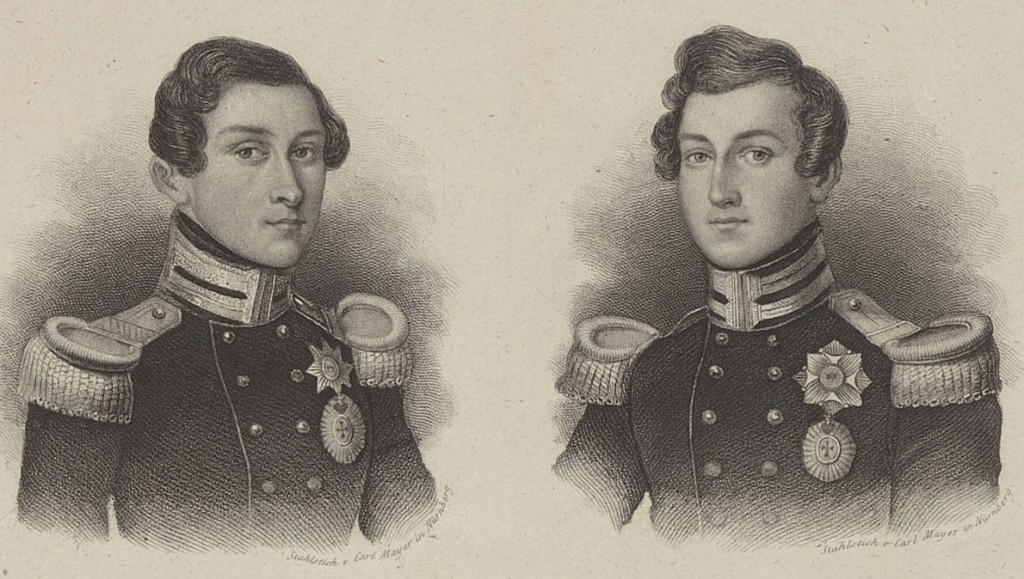
Engraving of Ernst and Albert c.1835 by Carl Mayer / Royal Collection Trust / © HM Queen Elizabeth II 2014
In May of 1836 Ernst and his father accompanied Albert to England for his first meeting with Princess Victoria. Albert’s health was tested by the demanding variety of entertainments provided. Ernst, being the more social and robust of the two, turned his attentions to what London had to offer. The visit, which lasted four weeks, was not the resounding success that had been hoped for. Albert, though unquestionably bright, was lacking in social graces and was often ill during the visit. Despite these youthful deficits, he did manage to leave a good impression on the young princess. As for Ernst, he preferred the visit to Paris on the return trip to Brussels. In addition to the extravagance of the Orleans’ court, his father introduced Ernst, much to his brother’s disgust, to the city’s more sordid delights.
It was decided by Leopold and Stockmar that it would benefit both princes immensely to spend the ten months before they were to begin university experiencing Brussels, rather than a return to Coburg. During the brothers’ stay, Leopold spared no expense to further his nephews’ education. Instruction for French and English was provided by Dr. Pierre Bergeron, Professor of rhetoric at the University of Brussels and the poet Dr Henry Drury. Sir Henry Lytton Bulwer, Secretary of the English legation was brought in for history and foreign affairs. For lessons on government administration, Leopold had his Cabinet Secretary enlighten the eager princes. Adolph Quetelet, the most prominent of their tutors, was engaged to instruct them in mathematics and statistics. Quetelet also introduced the young princes to prominent men living in Brussels. A house was provided for the princes’ use and they were free to entertain the expansive sea of scientists, intellectuals, and politicians that flooded the liberal environment of Belgium’s capital. The young princes were exposed to the inner workings of a constitutional government and were not shielded from public affairs. One of Ernst’s fonder memories of this period involved their freedom to visit and converse with exiled Italian nationalists.
In addition to academic pursuits, Ernst was also provided with the military training befitting his station. Even in this area Leopold had been careful to ensure high quality instruction, choosing military writer Col. Charles Guillaume Bormann as the tutor in charge. It also worked to the educational advantage of the two princes that – as a result of the Dutch King’s refusal to accept Belgium as an independent state – the Belgians and Dutch were still engaged in a cold war. This state of affairs allowed the princes to learn military skills in a fully operational training environment. Ernst, acting as General Staff Officer, was assigned Colonel Prodzinsky as a personal instructor.
On 3 May 1837, Ernst began his studies at the University of Bonn. The choice of Bonn was made after much careful deliberation between Leopold and Stockmar. Munich was seen as too ‘formal and priggish’; Berlin was too conservative; Jena and Göttingen were also ruled out. Bonn, a moderate and newer university, with an already excellent reputation for scholarship, was chosen as a good compromise. During his three semesters there, the young prince pursued studies, in addition to other subjects, in Jurisprudence and History. Though they were matriculated as nobles, the brothers made a great effort to fraternize with their fellow students. They hosted dinners in their semi-detached house and attended public lectures. Notes from these, were in Ernst’s words, “taken down in our beloved notebooks and gone over with the greatest conscientiousness”. In addition to academia he pursued athletics, notably fencing. During shared holidays, Ernst and Albert broadened their education with trips to northern Italy and the Swiss cantons.
When the brothers’ time at Bonn came to an end, Albert was sent on another tour of Italy. Ernst entered the Saxon military service at Dresden as a captain in the King’s regiment of Mounted Guards, after being denied a similar position in the Austrian service. While at the Saxon Court, Ernst was able to carry on his education and continued to live, with great pleasure, “amidst a stream of art and literature”. He also became well acquainted with the state’s administration and many of its elements. These were later integrated into his own government. Though he would remain in residence at Dresden until 1842, Ernst made many extended excursions during this period including his brother’s wedding and a tour of Spain and Portugal.
On 10 Feb 1840, he attended Albert’s wedding and was able to witness first hand the beginnings of Albert and Victoria’s relationship. Ernst remained in England for another three months occupying himself with learning the peculiarities of English society. He then availed himself of an opportunity to visit relatives in Portugal and Spain. During his travels, he kept his brother abreast of the political conditions in both countries. In Spain, he witnessed firsthand the insurrection at Barcelona of General Espartero against the regency of Queen Maria Christina in June 1840. He then returned to Dresden after a short trip to Coburg. These travels afforded Ernst, and to an extent other princes, an opportunity for first-hand exposure to international politics and an array of different cultures. In Ernst’s case, these proved especially instructive for he was provided with working examples of governance that he would later apply during his reign.
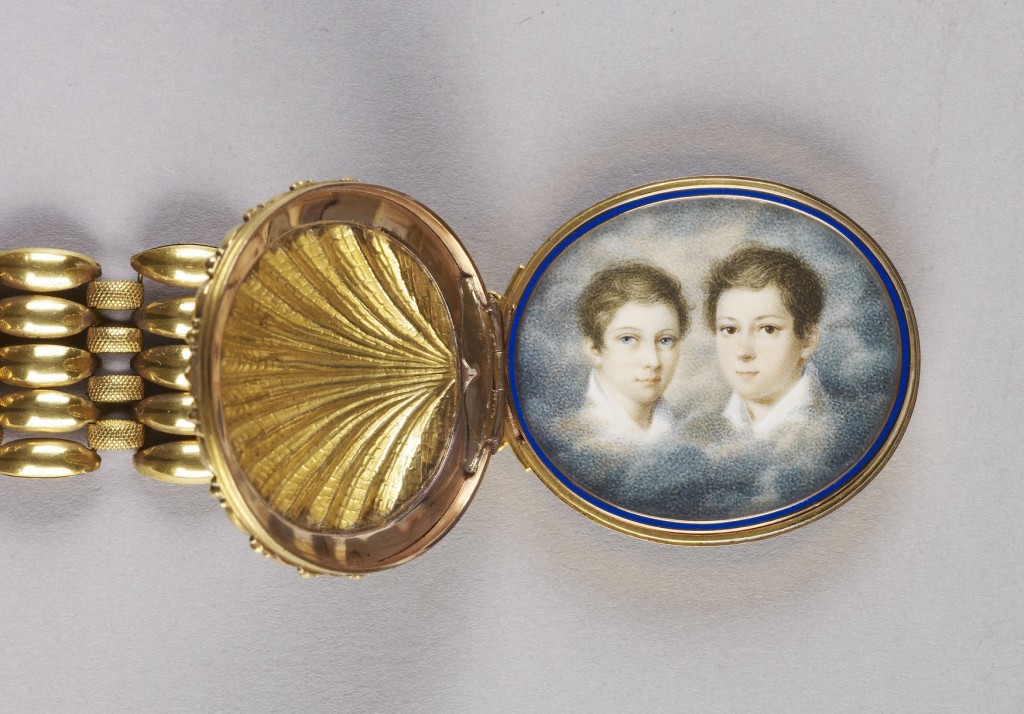
Watercolour Miniature on ivory c. 1831-32 by Sebastian Eckardt / Royal Collection Trust / © HM Queen Elizabeth II 2014
In January 1842 Ernst went to Karlsruhe to seek the hand of Princess Alexandrine of Baden, Albert’s candidate. In one of the most blunt proposals every uttered, Ernst declared,
‘Either tell me that you consent, and then I shall stay and we will learn to know one another better, or simply say one word which your parents perhaps kept back out of anxiety and consideration for me. I shall in that case leave this house with the firm conviction that no one else will ever know anything of what has taken place to-day.’
The Princess was obviously swept off her feet for she agreed to the marriage. It took place on 3 May 1842, with Ernst I and the Prince of Leiningen as the only family members present. After a brief stay at their new residence Schloss Callenberg, a family estate on the outskirts of Coburg, the royal couple honeymooned in Brussels and London.
Upon Ernst’s return from London, his father embarked on a serious course of instruction designed to equip his successor with a firm grounding in the affairs of government. He was given a position in the Ministry, with an active role in meetings and a substantial workload. Though there were disagreements between father and son on administrative questions, there were not, according to Ernst, any significant quarrels. In April of 1843, he acted as his father’s representative at the wedding of his cousin Augustus and Princess Clementine in Paris. In addition to his duties as heir, he continued his service with the Saxon army, earning the rank of Major-General shortly before his marriage. Unexpectedly, on 29 January 1844, Ernst I died, making twenty-six year old Ernst the new duke of Saxe-Coburg and Gotha.
Over the years, the brothers who had been inseparable in their youth did come to disagree with one another on many political and familial issues. Ernst became more conservative in his maturity, supporting plans of actions directly opposed towards Albert’s beliefs. This however, did not destroy the close sentimental relationship they shared. Ernst would outlive his younger brother by three decades. On recalling the morning he received the news of Albert’s death he stated “Just as, in early years, I had lost my father and my mother, so was I now, a childless man, destined to see my only brother die in the prime of his life”. In the aftermath of Albert’s death, Ernst’s relations with the British royal family markedly declined. Despite this breach and his increasingly conservative anti-English views, he accepted his brother’s second son Alfred as his heir. On 22 August 1893, Ernst died.
Further reading
- Saxe-Coburg-Gotha, Ernst von, Memoirs of Ernst II, Duke of Saxe-Coburg-Gotha (London: Remington & Co., Publishers 1888).
- Grey, Lt. Gen. C., The Early Years of His Royal Highness The Prince Consort. Compiled Under the Direction of Her Majesty The Queen (New York: Harper & Brothers, 1867).
- Martin, Theodore, Life of the Prince Consort. Vol. 1-5 (London: Smith, Elder, & Co., 1876).
- Weintraub, Stanley, Uncrowned King: The Life of Prince Albert (London: The Free Press, 1997).

